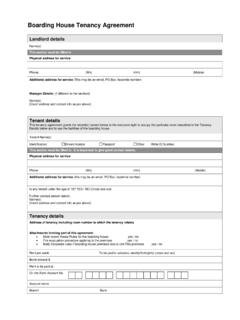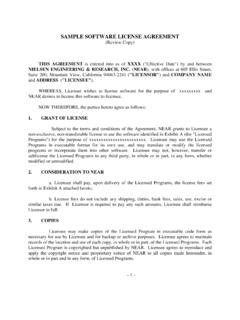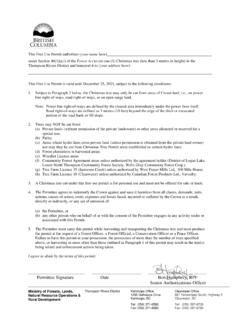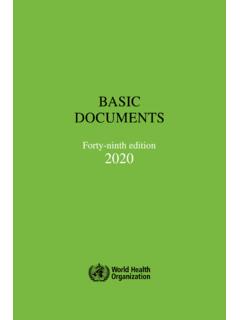Transcription of Revised Guidance issued under section 182 of the Licensing ...
1 Revised Guidance issued under section 182 of the Licensing Act 2003 April 2018 Revised Guidance issued under section 182 of the Licensing Act 2003 April 2018 Crown copyright 2018 This publication is licensed under the terms of the Open Government licence except where otherwise stated. To view this licence , visit or write to the Information Policy Team, The National Archives, Kew, London TW9 4DU, or email: Where we have identified any third party copyright information you will need to obtain permission from the copyright holders concerned.
2 This publication is available at Any enquiries regarding this publication should be sent to us at The Alcohol Team, The Home Office, 5th Floor, Fry Building (North West), 2 Marsham Street, London, SW1P 4DF. Email: Web ISBN 978-1-78655-639-4 Contents 1. Introduction 1 2. The Licensing objectives 6 3. Licensable activities 14 4. Personal licences 21 5. Who needs a premises licence ? 34 6. Club premises certificates 39 7. Temporary Event Notices (TENs) 42 8. Applications for premises licences 49 9. Determining applications 68 10. conditions attached to premises licences and club premises certificates 77 11.
3 Reviews 89 12. Summary reviews 95 13. Appeals 103 14. Statements of Licensing policy 106 15. licence fees 121 16. Regulated entertainment 123 17. Early morning alcohol restriction orders 141 Revised Guidance issued under section 182 of the Licensing Act 2003 I 1 1. Introduction The Licensing Act 2003 The Licensing Act 2003 (referred to in this Guidance as the 2003 Act), its explanatory notes and any statutory instruments made under it may be viewed online at The statutory instruments include regulations setting out the content and format of application forms and notices. The Home Office has responsibility for the 2003 Act.
4 However, the Department for Culture, Media and Sport (DCMS) is responsible for regulated entertainment, for which there is provision in Schedule 1 to the 2003 Act (see Chapter 16). Licensing objectives and aims The legislation provides a clear focus on the promotion of four statutory objectives which must be addressed when Licensing functions are undertaken. The Licensing objectives are: The prevention of crime and disorder; Public safety; The prevention of public nuisance; and The protection of children from harm. Each objective is of equal importance. There are no other statutory Licensing objectives, so that the promotion of the four objectives is a paramount consideration at all times.
5 However, the legislation also supports a number of other key aims and purposes. These are vitally important and should be principal aims for everyone involved in Licensing work. They include: protecting the public and local residents from crime, anti-social behaviour and noise nuisance caused by irresponsible licensed premises; giving the police and Licensing authorities the powers they need to effectively manage and police the night-time economy and take action against those premises that are causing problems; recognising the important role which pubs and other licensed premises play in our local communities by minimising the regulatory burden on business, encouraging innovation and supporting responsible premises.
6 Providing a regulatory framework for alcohol which reflects the needs of local communities and empowers local authorities to make and enforce decisions about the most appropriate Licensing strategies for their local area; and encouraging greater community involvement in Licensing decisions and giving local residents the opportunity to have their say regarding Licensing decisions that may affect them. 2 | Revised Guidance issued under section 182 of the Licensing Act 2003 The Guidance section 182 of the 2003 Act provides that the Secretary of State must issue and, from time to time, may revise Guidance to Licensing authorities on the discharge of their functions under the 2003 Act.
7 This Revised Guidance takes effect as soon as it is published. Where a licence application was made prior to the publication of the Revised Guidance , it should be processed in accordance with the Guidance in effect at the time at which the application was made; the Revised Guidance does not apply retrospectively. However, all applications received by the Licensing authority on or after the date the Revised Guidance was published should be processed in accordance with the Revised Guidance . Purpose This Guidance is provided to Licensing authorities in relation to the carrying out of their functions under the 2003 Act.
8 It also provides information to magistrates courts hearing appeals against Licensing decisions and has been made widely available for the benefit of those who run licensed premises, their legal advisers and the general public. It is a key medium for promoting best practice, ensuring consistent application of Licensing powers across England and Wales and for promoting fairness, equal treatment and proportionality. The police remain key enforcers of Licensing law. This Guidance does not bind police officers who, within the parameters of their force orders and the law, remain operationally independent.
9 However, this Guidance is provided to support and assist police officers in interpreting and implementing the 2003 Act in the promotion of the four Licensing objectives. Legal status section 4 of the 2003 Act provides that, in carrying out its functions, a Licensing authority must have regard to Guidance issued by the Secretary of State under section 182. This Guidance is therefore binding on all Licensing authorities to that extent. However, this Guidance cannot anticipate every possible scenario or set of circumstances that may arise and, as long as Licensing authorities have properly understood this Guidance , they may depart from it if they have good reason to do so and can provide full reasons.
10 Departure from this Guidance could give rise to an appeal or judicial review, and the reasons given will then be a key consideration for the courts when considering the lawfulness and merits of any decision taken. Nothing in this Guidance should be taken as indicating that any requirement of Licensing law or any other law may be overridden (including the obligations placed on any public authorities under human rights legislation). This Guidance does not in any way replace the statutory provisions of the 2003 Act or add to its scope and Licensing authorities should note that interpretation of the 2003 Act is a matter for the courts.

















